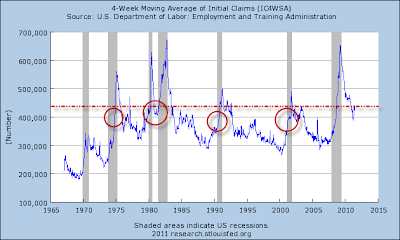| China's Top Auditor Warns of Chinese Local Government Defaults Posted: 28 Jun 2011 04:16 PM PDT Lost in the worry over Greek debt defaults, China Daily reports on a default story of more significance. Please consider Local governments run up huge debts, risk defaultingLocal governments had an overall debt of 10.7 trillion yuan ($1.65 trillion) by the end of 2010, said China's top auditor on Monday in a report to the National People's Congress.
He warned that some were at risk of defaulting on payments.
It was the first time the world's second-largest economy publicly announced the size of its local governments' debts. The scale amounts to more than one-quarter of its GDP in 2010, which stood at 39.8 trillion yuan.
Concerns are rising that the problem of local government debt could destabilize the financial system of the country if it is not managed properly, especially after the central government's tightening of the housing market, which could affect local fiscal revenue that is highly dependent on land sales and make debt repayment more difficult.
In addition, China's ambitious plan to construct 36 million affordable homes during the coming five years, including 10 million in 2011 and 10 million in 2012, added to worries about increasing capital tension and rising non-performing loans in commercial banks.
About 79 percent of the local government loans were made by banks across the country, according to the NAO.
Lu Zhengwei, chief economist at the Industrial Bank, said the figures released were moderate compared with previous estimates, and risks lying in these loans are quite limited.
"Overdue loans take up only a small proportion of the total lending and local governments didn't pay them in a timely way mainly because deadlines were too concentrated, not because of deteriorated ability to repay." $1.65 Trillion is a mountain of cash even to the US. How much of that is at risk is the question, but even 10% would be significant. Moreover, it is certain that what cannot be paid back, won't be paid back. As in the US, once assets backing loans crash, so will willingness and ability to pay back the loans. Thus, efforts by some to downplay the odds should fall on deaf ears. Speculation in China is as least as rampant as it was in the US. For example, please consider Ponzi Financing Involving Copper Trade Gone Wild In China. Also consider Wave of Violent Protests, Rioting, Bombings Hits China; Expect More Riots When China's Credit Bubble Pops, Exposing Mountains of FraudFinally, please consider World's Biggest Property Bubble: China's Ghost Cities Revisited; 64 Million Vacant PropertiesAs long as credit bubbles expand, no one heeds warnings like that issued by China's top auditor. Then when the bubble bursts, everyone cries they were not warned, they were taken advantage of, and they deserve a bailout. One thing's for certain, when China's credit bubble pops, it will rock the world. Mike "Mish" Shedlock http://globaleconomicanalysis.blogspot.com
Click Here To Scroll Thru My Recent Post List 

|
| Air Conditioning Afghanistan Troops Costs $20 Billion Per Year; Cost of One Soldier is $1 Million a Year; Hotel California Posted: 28 Jun 2011 03:06 PM PDT If people realized how much we were wasting in stupid wars that should never have been fought, there might be far more protests. Please consider Among The Costs Of War: $20B A Year In Air Conditioning?The amount the U.S. military spends annually on air conditioning in Iraq and Afghanistan: $20.2 billion, according to a former Pentagon official.
That's more than NASA's budget. It's more than BP has paid so far for damage during the Gulf oil spill. It's what the G-8 has pledged to help foster new democracies in Egypt and Tunisia.
"When you consider the cost to deliver the fuel to some of the most isolated places in the world — escorting, command and control, medevac support — when you throw all that infrastructure in, we're talking over $20 billion," Steven Anderson tells weekends on All Things Considered guest host Rachel Martin. Anderson is a retired brigadier general who served as Gen. David Patreaus' chief logistician in Iraq. He's now in the private sector, selling technologies branded as "energy-efficient" to the Department of Defense.
Why does it cost so much?
To power an air conditioner at a remote outpost in land-locked Afghanistan, a gallon of fuel has to be shipped into Karachi, Pakistan, then driven 800 miles over 18 days to Afghanistan on roads that are sometimes little more than "improved goat trails," Anderson says. "And you've got risks that are associated with moving the fuel almost every mile of the way."
Anderson calculates more than 1,000 troops have died in fuel convoys, which remain prime targets for attack. Free-standing tents equipped with air conditioners in 125-degree heat require a lot of fuel. Anderson says by making those structures more efficient, the military could save lives and dollars.
Still, his $20.2 billion figure raises stark questions about the ongoing war in Afghanistan. In the wake of President Obama's announcement this week that 33,000 American troops will soon return home, how much money does the U.S. stand to save?
Dollars And Cents
The 33,000 troops who will return home by the end of next year match the numbers sent to Afghanistan in 2010, at a cost of about $30 billion. That comes out to about $1 million a soldier.
But the savings of withdrawing those troops won't equal out, experts say.
"What history has told us is that you don't see a proportional decrease in spending based on the number of troops when you draw them down," Chris Hellman, a senior research analyst at the National Priorities Project, tells Martin.
"In Afghanistan that's going to be particularly true because it's a very difficult and austere environment in which to operate," he says.
That means most war expenditures lie not in the troops themselves but in the infrastructure that supports them — infrastructure that in some cases will remain in place long after troops are gone.
"We're building big bases," American University professor Gordon Adams tells Martin. The costs of those bases are, in economic terms, "sunk" costs, he says.
"We're seeing this in Iraq. We're turning over to the Iraqis — mostly either for a small penny or for free — the infrastructure that we built in Iraq. But we won't see back any money from that infrastructure."
And more importantly, Hellman says, "[Afghan President Hamid] Karzai indicated a couple years back that [Afghanistan] wasn't going to be a position to support their own military forces 15, 20 years out. I suspect we're going to be called on to pay a substantial part of that bill going forward."
One outspoken critic is Sen. Joe Manchin (D-WV). He notes the wars in Afghanistan and Iraq have cost hundreds of billions of dollars so far, and he argues a larger troop drawdown isn't a national security risk.
"When you have this many people in a country that doesn't want you there — that has no economy, no infrastructure and a corrupt government — and you're trying to stabilize it and build them into a viable nation? I'm not sure we have enough time, and I definitely know we don't have enough money," Manchin says. Do the Troops Deserve Air Conditioning?Some may be asking if US troops deserve air conditioning? The question may sound reasonable, but it poses a false dichotomy. There are more important considerations. First and foremost, US troops deserve to not be put in harm's way for no reason. The simple fact of the matter is that there is no legitimate reason to be in Afghanistan, in Pakistan, in Iraq, or in 140 other countries at a cost to US taxpayers. Thus, the air conditioning question should never arise in the first place. If other countries want us there, they should foot the bill. If they don't want us there then we should leave. The US could cut its military budget by 50% or more with no detriment to actual defense of the United States. In fact, there would probably be a huge improvement in the defense of the United States. The reason is simple - terrorist problems have arisen because we are meddling in countries where we have no business being in the first place. Iraq vs. VietnamFor an interesting perspective, please consider Iraq War Deaths Exceed Vietnam War NumbersHowever, it is not fair to just look at US deaths. Wikipedia notes "the Vietnamese communist government in 1995 estimated that 2,000,000 Vietnamese civilians on both sides died in the war." The absurd war in Vietnam did not end until US citizens got fed up with it and demanded change. Unfortunately millions of lives were ruined before change came. Hotel CaliforniaHow much more will people put up with now before they demand change? How long will the US remain in Iraq and Afghanistan? Before answering that last question answer this one: How long has the US been in South Korea and Japan? As with the Hotel California, the US may check out, it just never leaves. Mike "Mish" Shedlock http://globaleconomicanalysis.blogspot.com
Click Here To Scroll Thru My Recent Post List 

|
| Congratulations to California: State to Pass Budget, Close $9.6B Deficit, Without Tax Hikes Posted: 28 Jun 2011 11:32 AM PDT Congratulations to all California legislators willing to tell governor Jerry Brown where to stuff it. Without needing republican votes, California set to pass budget, close $9.6B deficitCalifornia lawmakers and Gov. Jerry Brown are set to achieve something rarely accomplished in California -- getting a budget signed into law by the July 1 start of the fiscal year.
Both houses of the Legislature have scheduled late afternoon sessions Tuesday to vote on a Democratic budget that can be passed with a simple majority vote. That means no Republican support is needed.
Democratic lawmakers and the governor crafted the plan after Brown vetoed a budget approved on the Legislature's constitutional deadline, June 15. The state controller determined that plan was not balanced and used the provisions of a recent ballot initiative to halt lawmakers' pay.
This plan relies on spending cuts, a projected $4 billion rise in tax revenue and fee increases to close a $9.6 billion deficit.
Balanced Budget MirageBear in mind this so-called "balance budget" is a mirage. Tax revenue is not going to be sustainable. When this plan fails, and it will fail (but only after it passes), Republicans can stand firm again and demand more cuts. Mike "Mish" Shedlock http://globaleconomicanalysis.blogspot.com
Click Here To Scroll Thru My Recent Post List 

|
| "Land of the Predictable": Pimco CEO Warns U.S. Debt Default Might Have "Catastrophic" Effect; Obama's Hypocrisy Posted: 28 Jun 2011 01:29 AM PDT In yet another of the seemingly endless self-serving fear-mongering exercises, Pimco's El-Erian Says U.S. Debt Default Might Have 'Catastrophic' EffectPacific Investment Management Co. LLC Chief Executive Officer Mohamed El-Erian said a short-term default by the U.S. on its debt might have "catastrophic" legal consequences.
"We would be in the land of the unpredictable" if lawmakers fail to reach an agreement to raise the $14.3 trillion debt ceiling and the U.S. misses a payment "simply because of the technical linkages," El-Erian said in an interview on CNN's "Fareed Zakaria GPS" program, scheduled to air today.
U.S. lawmakers are seeking a path to increasing the debt limit and to cutting at least $1 trillion from the long-term deficit before an Aug. 2 deadline. President Barack Obama plans to hold separate meetings at the White House June 27 with Senate leaders Arizona Democrat Harry Reid and Kentucky Republican Mitch McConnell in an effort to break an impasse that scuttled a seven-week negotiating effort led by Vice President Joe Biden.
"My advice is please try and get together and solve this issue in the context of a medium-term reform package," El-Erian said. "If you can't do that and you're going to kick the can down the road, kick the can rather than face something that could be catastrophic in terms of legal contracts being triggered."
"So when we look at Treasuries, we see the big buyer stepping away from the market, for certain. And we ask the question, who else is going to be buying at these levels, and we can't identify another buyer of the size of the Fed."
El-Erian said the U.S. fiscal problems are dwarfed by those of Greece, whose debt reached 143 percent of gross domestic product last year.
"It is inevitable that Greece would have to restructure its debt," he said. "Greece has two problems: it has too much debt and it cannot grow. And until these problems are solved, more and more of Europe is going to become contaminated." "Land of the Predictable"I mock the lame fear-mongering excuses of government officials, politicians, and in this case buyers of government and agency debt who do not want to see interest rates rise out of fear of what it would do to the short-term value of their portfolios. Thus it was entirely predictable that Pimco would issue a "Catastrophic" warning. As for who would buy US government debt, that answer is quite easy to explain: China and Japan would as a function of trade-deficit math, and they would add to that total, as would the UK, Canada, and Europe. El-Erian knows just that (as much as anyone knows anything in the land of the unknowable). The biggest irony in El-Erian's statement is Pimco would be a buyer, and so would millions of others if interest rates rose high enough. Finally, interest rates would come crashing back down as soon as an agreement was worked out and there is no doubt an agreement will be reached sooner rather than later. The only thing "unpredictable" is the exact nature of that agreement. Shutdowns Happened Twice BeforePlease note that US government shutdowns have happened twice before, in 1995 and 1996 under president Clinton. The United States federal government shutdown of 1995 and 1996 was the result of a conflict between Democratic President Clinton and the Republican-controlled Congress over funding for Medicare, education, the environment and public health. It took place after Clinton vetoed the spending bill which Congress sent him. Thereupon, the Federal government of the United States put non-essential government workers on furlough and suspended non-essential services from November 14 through November 19, 1995 and from December 16, 1995 to January 6, 1996. The major players were President Bill Clinton and the Speaker of the U.S. House of Representatives Newt Gingrich. Nothing Catastrophic HappenedAmidst all this fear-mongering by president Obama, Pimco, and others, I calmly point out that nothing catastrophic happened last time, and there is no reason to believe anything catastrophic would happen this time. President Obama's HypocrisyInquiring minds just may be interested in knowing Obama's track record on debt ceilings when he was Senator Obama. The Obama administration is warning of catastrophic consequences if Congress does not increase the debt ceiling, the legal limit on how much the federal government can borrow, but Barack Obama held a different view on the issue as a senator in 2006.
Five years ago, then-Sen. Obama (D-Ill.) voted against raising the debt ceiling and even spoke about it on the Senate floor before the Republican-controlled Senate voted 52-48 to increase it.
"The fact that we are here today to debate raising America's debt limit is a sign of leadership failure," Obama said on March 16, 2006. "Leadership means that 'the buck stops here.' Instead, Washington is shifting the burden of bad choices today onto the backs of our children and grandchildren. America has a debt problem and a failure of leadership. Americans deserve better. I therefore intend to oppose the effort to increase America's debt limit." Failure of LeadershipI remind the president " The fact that we are here today to debate raising America's debt limit is a sign of leadership failure. Washington is shifting the burden of bad choices today onto the backs of our children and grandchildren. America has a debt problem and a failure of leadership. Americans deserve better." I urge Congress to disregard the self-serving fear-mongering of president Obama and Pimco CEO El-Erian because we have a debt problem and a failure of leadership to do anything about it. Americans deserve better, and the way to do that is to act responsibly on a deficit-reduction package, now, not 10 years from now. Mike "Mish" Shedlock http://globaleconomicanalysis.blogspot.com
Click Here To Scroll Thru My Recent Post List 

|

















